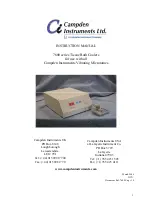
Key Concepts
Landmark™ Test System Operation
51
Sensor Limits
One type of detector is a limit detector for sensor input signals. Each sensor can have a high and a low
limit which you can enable separately. When a sensor exceeds (or
trips
) its upper or lower limit, the
selected detector action occurs.
Detector Actions
The effect a tripped detector has on the system depends on the action you select. The action may
result in the removal of hydraulic pressure from the station, the program stopping, an entry written to
the Message Log, and various other actions you can select.
Setting Limits Before Specimen Installation
Before installing the specimen, it is best practice to set upper and lower force limit detectors to levels
that protect the specimen from damage and minimize the risk of injury to yourself, and to set the action
to "Interlock." For instance, in the Example Test, before you install the specimen you set the maximum
tensile force to 5,000 N (5 kN) to protect the specimen from excessive gripping force. You also set the
maximum compressive force to -50 N (-0.05 kN) to reduce the risk of injury due to a compressive force
while working in close proximity to the actuator.
Setting Limits Before Testing
After the specimen is installed and you are ready to run the test, it is best practice to adjust the upper
and lower force limit detectors to levels that will not interfere with forces that the test procedure is
designed to apply to the specimen. In general, this means you will extend detector limits values. For
instance, in the Example Test, before you run the test you adjust the maximum tensile force to 15,000
N (15 kN), and the maximum compressive force to -1,000 N (-1 kN). In this case, if you did not adjust
the force detector levels from the levels set before installing the specimen, the detectors would trip as
soon as you start the test.
Using the E-Stop Control
If something unusual occurs that requires immediate action, use the Emergency Stop (E-Stop) control
to:
l
Stop whatever setup operation or test you have in progress, and
l
Remove hydraulic pressure from the station.
While using your system, always keep in mind where the E-Stop control is and what it does. The E-
Stop control is located on the load frame control panel. It is a large red button on a yellow striped
background. The emergency stop switch stays activated until you twist the knob as indicated by the
arrows.
Understanding the Load Train
It is important to understand the components in the load train. When installing and removing the
specimen and performing test setup, you interact with elements of the load train.
Summary of Contents for Landmark 370 Series
Page 39: ...System Introduction Landmark Test System Operation 39...
Page 40: ......
Page 114: ......
Page 122: ......
Page 123: ...Decommissioning Landmark Test System Operation 123 Decommissioning Decommission 124...
Page 132: ......
Page 133: ......
















































